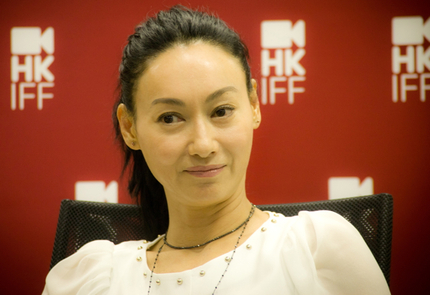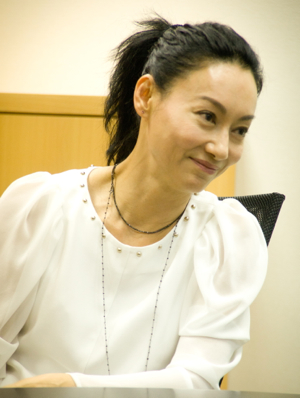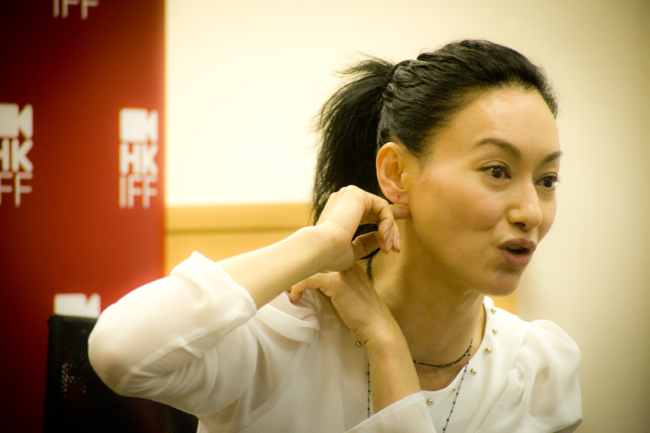Paris Cinema IFF Interview: Kara Wai Ying Hung on Kung-Fu and Comebacks

Tomorrow marks the launch of the 10th Paris Cinema International Film Festival, and one of the highlights of their packed programme is the incredible Hong Kong In Focus segment. Curated in a special collaboration with the Hong Kong International Film Festival Society, the festival will screen more than 80 films from the city's post-war era, many of them showing in France for the very first time. The festival has invited a number of celebrated filmmakers and performers to attend the event, introduce some of their most acclaimed films and participate in post-screening Q&A sessions with the audience. Among the luminaries heading to Paris are directors Johnnie To and Ann Hui, world-class action choreographer Yuen Wo Ping and veteran martial artiste Kara Wai Ying Hung.
Ms. Wai will be attending the PCIFF screening of Lau Kar Leung's classic Martial Club on 4th July, but before she left for Paris, ScreenAnarchy was granted the opportunity to speak with her about her career in Cinema. I began by asking her what she felt was so special about Martial Club and how well it represented her work:
Kara Wai - I don't know how to describe this movie, but it reveals a unique aspect of Chinese culture. It features the kind of authentic martial arts club that you hardly ever see today in Hong Kong or Chinese movies. It's a really classic movie. My part was more of a supporting role, but back then supporting roles were more important than they are today. It was in the early stages of my career and I hadn't had the lead in any of Lau Kar Leung's movies yet. Martial Club is really a guys' movie.
ScreenAnarchy - So which films do you think better represent your work onscreen?
My Young Auntie, of course, but my favourite role was in The Eight Diagram Pole Fighter. That film shows off my skills well, and I had a really outstanding character in the movie. I also really like The Legendary Weapons of China, because you can see real Chinese martial arts and we use lots of traditional weapons. Each one has a different meaning and must be used in a particular way, representative of either the Northern or Southern styles of Chinese martial arts, which are very different. This movie makes that difference very clear and also shows the difference between martial arts for performance and martial arts for combat. This is what makes the film a great representation of both Chinese and Hong Kong Cinema.
How difficult is it switching from one style of martial arts to another?
My background is in Northern style martial arts and Chinese dance, so my foundation is pretty good for kung-fu. However, Lau Kar Leung's style is Southern, so when we made this film he was always trying to change his style to better suit me, and he was very good at making the most of my Northern style, which he always believed looked better on screen. Lau never forced me to adopt the Southern style. Instead, he created a mix of the two especially for me. In Southern kung-fu, like wing chun, you use the Muk Jong (wooden dummy) and kick from a standing position, for close-quarter fighting with more focus on power and speed. A lot of kung-fu you see in movies is actually from the North because it looks much better. You can still kill people using the Southern style, but it just doesn't look very good on screen. Since the first film Lau and I worked on together, he began using more Northern style kung-fu in his choreography, because it includes flipping and somersaults. He really liked the way it looked on screen so even in films about the South, involving lion dancing for example, Lau would incorporate some elements of Northern style kung-fu.
Is that still the case today? With so many recent retellings of the Ip Man story, for example, is Southern style kung-fu becoming more popular?
Not really. Jackie Chan has always used the Northern style, and he also helped influence Lau Kar Leung to use it more. Jackie always fights kind of like a clown, but there's always a lot of power in his jumping and acrobatics. Donnie Yen, however, started out using Southern style kung-fu in his early roles, like Fist of Fury, even though his mother, who was a weapons champion in China and also my teacher, practices Northern style kung-fu. Though recently you can see Donnie using Northern kung-fu in films like Wu Xia.

When you first started out, how difficult was it breaking into such a male-dominant industry?
Actually I didn't have any difficulties getting into the business beacause back then there wasn't any competition. There really weren't any other female martial artistes around who were in my age group. That's how I was cast in The Braver Archer, and when that movie came out, people seemed quite impressed with what I could do. Then Lau Kar Leung put me in his new movie, Mad Monkey Kung-Fu, and was pleased with what I did so he wrote a script especially for me. There was never any doubt that I would get that part as there was no one else around and I have my own very particular interpretation of Northern style kung-fu that nobody else was doing back then. Even someone like Cheng Pei Pei is very different from me. Her style is all about posture and she would use a stunt double quite a lot, while my kung-fu was really unique, so there was no fear of her replacing me. Some actresses who came later, like Michelle Yeoh, Cynthia Khan and Moon Li, all have a dancing background, which is a great foundation for Northern kung-fu. You need to be very flexible and have a long reach. Jet Li is also from the North, although when he played Wong Fei Hong (in the Once Upon A Time In China series) he adopted a Southern style. It's much easier for practioners of Northern style kung-fu to build up their muscles and adopt Southern kung-fu than it is for muscular Southern style martial artists to gain the flexibility necessary for Northern kung-fu.
Many of the established martial arts stars in the region are getting close to retirement age, with few obvious successors. Which of the younger generation do you think has what it takes to be a real martial arts star?
Nowadays a lot of the actors who do kung-fu in movies aren't using real kung-fu, just some tricks and simple moves that they're taught by the action director to look good on screen. Pretty much anyone can be a kung-fu star today.
Is CGI a factor in that?
There are lots of things. Back in the old days we didn't have much technology to rely on so actors and actresses had to really know kung-fu and so did the directors. Lau Kar Leung, Yuen Wo Ping and even Donnie Yen are all kung-fu masters themselves so demand real martial arts and martial artists in their movies. Today you dont see real kung-fu in movies because, firstly, the artists don't want to get injured, also they don't have the time to learn it, and directors don't want to spend so much time training them. Technology can help because now there are fewer movements in the movie, but previously we would use more than 30 different movements in each scene so we would have no choice but to do it for real. We would spend all day on a single move in order to get it right, but now that's not necessary as there are stuntmen to do it for you. These days there really aren't any proper martial artists. Back in the day we might require 30 days to shoot one scene, but now you could probably finish two movies in that time. Nobody wants to spend that much time getting it right anymore.
But it's also cheaper and safer to do it this way, no? Do you find this attitude becoming more prevalent and more of a problem?
The first reason is budget restrictions, while reason two is that artists nowadays are more versatile and don't concentrate on just one thing. Stars today are actors and singers, and TV stars and out endorsing products and do lots of different things. Back in the old days you would focus on one thing: I am a martial artist, or I am a singer. These days they smply don't have the time to train and become a proper martial artist. It's not that the artists can't get better at martial arts but their management doesn't let them invest the necessary hours in it.
Who does have what it takes in your opinion?
I can see that Nicolas Tse has really trained hard at martial arts and has a real passion for it. He could probably teach others too. For females, I think that Gillian Chung has the natural talent inside her. If someone doesn't have the natural talent they look really clumsy or stupid and you can spot it immediately. When you watch Gillian doing martial arts in movies like Twins Effect I & II, you can see there's real talent in her movements. Maybe she stopped afterwards, but you can really see that she was athletic enough and understood what she was doing - and that's a great foundation for getting better. If Gillian's management let her spend more time training then I think she could become even better than me.
After 10 years away from making martial arts films, how difficult was it getting back in shape to fight Donnie Yen in Wu Xia?
I'm naturally talented. I don't really like kung-fu. I've never really liked kung-fu but I like being in action movies. I'm the kind of person who likes to learn my moves on set and perform it right away in front of everyone.
We are seeing you crop up in lots of different movies now. Do you think you'll continue making action films?
No, well, I don't know. It depends how I feel. If I get a good script with a decent story then I'll do it. I don't have a plan to do lots of different kinds of movies, I'm just taking things easy. I'll only do an action movie if I think I'm fit enough. Over the years I've suffered so many injuries: broken leg, torn ligaments, dislocated joints, fractured bones, I injured my waist, dislocated my lower back, hurt my neck, cracked my ribs.
I can see why you're hesitant to get back into it.
Yes, over the last ten years I've set up my own physical therapy clinic here in Hong Kong and I'm now a fully licensed physiotherapist. I got injured so often that I wanted to learn something about how to treat myself. And I also suffered from depression, so I decided to study psychology.

What convinced you to return to making action movies?
Actually it was nobody's idea because for martial artists it is very difficult to become a straight dramatic artist. Look at Donnie Yen or Jackie Chan. Everyone likes diversity, but for HK and China market, if you are a martial artist, you will only ever be a martial artist. Your image is very difficult to change. Over the past decade, I didn't act at all for five years. During that period the style for female martial artistes changed, so dramatic directors won't see your work, while action movie directors don't need you anymore. That's why in those five years I was desperate to change my style, but it was really hard, and I started having mental health problems. It was one of my very good friends, Ann Hui, who told me how good she thought I was, but back then I didn't do many movies, so we hadn't had the chance to work together. At that moment, Ann was preparing a new movie, in which there was a role she thought would really suit me, and she managed to persuade me to do it. So I started acting again because of Visible Secret and Night Corridor.
Ho Yuhang, the director of At The End Of Daybreak, had approached me three years before filming began. I had been wanting to do straight drama for a while but without any luck, and suddenly I had all these opportunities. Suddenly there was a chance for me to show the other side of Wai Ying Hung. And it was all down to luck. I had only just recovered from my illness and my attitude and perspective were now completely different. "Really?" I thought. "You want me to play a mother? A crazy mother?!" This was a real challenge for me to overcome. After I got over my depression, I began to see things more clearly and everything seemed more beautiful. Only then was I willing to start taking chances. I had the opportunities in the past but I didn't take them. I would always just talk myself out of it.
So you never wanted to give up for good?
That depends. It was kind of my plan to keep acting, but if nobody wants to cast you then it's all just hot air. Then at the right moment I got a chance. I was prepared and my perspective had changed.This was a part that I really really wanted, because I had fallen from my peak and I couldn't get back, so I knew I had to grab this chance. I wanted to start my career all over again with this movie, but if you had asked me to do this kind of mother role five years before, I don't think I could have convinced myself to do it.
Isn't the real problem that there is just a lack of good roles for women over the age of 40? It seems that men can keep their careers going indefinitely, but women of a certain age will always struggle to fnd good roles.
I am facing that exact problem but I am well-prepared. From the age of 35 onwards, it's a very embarrassing age for actresses, because you're not going to get a romantic lead any more, but you're much too young to play a mother. When I hit 40 I was really embarrassed and I just ddn't know what to do. So when I was offered a mother role I didn't think I was at that stage yet, but physically I looked like somebody's mother. For men, they have no problem because as they get older people will always say they get more handsome and sexier. For women, when we get into our thirties people will think, "She's old. What can she do now?" And when you turn 35, people think you should just retire. But once you reach 50 your perspective changes and everything just falls into place. I think actors really need time to adapt to this transition. When you see a mature artist showing more of their real personality, they are usually over 50 and have had that experience and made that transition. Your perspective changes over time and you've also gained life experience, so some types of roles just become easier to perform without much effort, and those often seem to be the roles the audience responds to really well.
Do you also find that the action roles you get offered change? It seems to me that once they reach a certain age, action stars - both male and female - only ever get cast as the villain.
Yes! I don't know why, it happens all over the world. Perhaps it's because of our wrinkled skin. Maybe it makes us look evil. Maybe that's why I am a bad guy now.
Have you had any offers to work overseas, in Hollywood for example?
Not recently. But timing is everything in this industry. Back in the day there was a chance to do something in Hollywood - The Matrix. When I read the script I thought, "Wow, what a small, insignificant part!" It was a character called The Key Man, which Collin Chou ended up playing. If they offered me this part now I would probably take it and make an effort to do it in a beautiful way. The action director in that movie was Yuen Wo Ping, so that's probably why I was considered for the part. But at the time I felt that this role didn't have much to it, and could've just been played by a stuntman - and I'm not a stuntman! Today everything is different. If I was offered that role now, I could adapt it in lots of different ways, I wouldn't just see it as a straight-up action role. I didn't receive any Hollywood offers recently but I am focusing on the Mainland China market.
In the mainland, people know me either as an action star in films like The Inspectors Wear Skirts, which was a big hit, or from the TV dramas I've been appearing in recently. So now people cast me in movies usually based on my work in At The End Of Daybreak or other similar roles. But for TV roles, I am being hired because of my old image. Some of my old movies have been sold to Celestial TV in the mainland, so people are still aware of who the old Wai Ying Hung is, even while my new TV dramas are screening at the same time. Today, that's the biggest market around. I am just going straight, I don't want to make things complicated for myself.
Photos by Rachael Lawson
Many thanks to Agnes Chiu and Mico Low for their help with the translation.

Do you feel this content is inappropriate or infringes upon your rights? Click here to report it, or see our DMCA policy.






